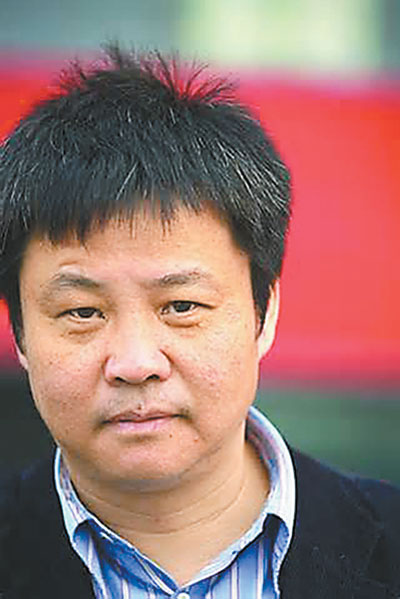
AFTER a seven-year wait, well-known Chinese author Yu Hua’s new novel, “The Seventh Day,” finally was released for mainland readers June 14.
But the overwhelming attention before publication did not result in corresponding praise for the book. Just like the embarrassment of “Brothers,” another novel by Yu that was released in 2006, “The Seventh Day” has been described as “a failed news skewer with boring language and a blog collection of Han Han and Li Chengpeng.”
Yu is a representative writer of the avant-garde literary upsurge of the mid-1980s and 1990s. A film by Zhang Yimou, which was adapted from Yu’s early novel “To Live,” was banned in 1994, which helped Yu earn high international recognition. Until Mo Yan won the Nobel Prize last year, Yu was far more well-known internationally than other leading authors in China.
Labeled by the publisher as “a more desperate work than ‘To Live’ and a more ridiculous work than ‘Brothers,’” the new novel is about a man’s seven-day trip after his death. Yang Fei, the book’s main character, dies in an accident but can’t afford burial in an expensive cemetery, so he becomes a solitary drifting soul without a burial place. So he starts seven days of infernal wandering and meets other dead souls who, like him, did not have the money to buy a burial plot and ended up wandering as ghosts. The meetings lead Yang to experience a series of absurdities, which are actually a reflection of real occurrences in the daily lives of Chinese people.
However, many readers and critics said the book was a failed production and felt nothing like Yu’s previous works.
Many thought that it was more like a boring news skewer than a novel.
“There is no strong character in the novel. The characters are just glue to hold the news pieces together,” a netizen called yjkiwi said on Sina Weibo.
“To be frank, ‘The Seventh Day’ does not fail because Yu wrote too many absurd social news stories into a novel. It fails in more aspects on a technical level, such as failed language, failed details, failed dialogues and failed styles. If this book was written by some unknown person, it would never have the chance to be published and would even be laughed at by editors,” said Luo Zhiqiu, an English teacher from Nanjing University in Jiangsu Province.
To make it worse, well-known, young Chinese writer and blogger Han Han wrote an article about his thoughts on novels in general on Sina Weibo on June 18, and made what appeared to be strong references to “The Seventh Day.”
“I think a good novel should be more pure, describing the wide world and exploring complicated human nature,” Han wrote. “Large amounts of news stories and opinions should not be put into a novel. Those are the things for media, microblogs and forums to do.”
Han’s article was seen as a criticism of Yu’s new book and spurred scores of comments about “The Seventh Day.” Han did not explain his purpose in writing the article, but only a few netizens thought it was just a coincidence.
Although “The Seventh Day” received mostly criticism, it still has seen strong sales across the country. Its print edition and Kindle edition have become the best-selling and the second best-selling novel, respectively, on Amazon.cn.
“Yu is not afraid of being criticized. ‘Brothers’ sold well because of the criticism,” said Chen Cun, another popular author.
However, sales of the book in Shenzhen have not been as good as expected. Only 80 copies had been sold at the city’s three major book stores as of June 20.
Responding to the criticism, Chen Mingjun, chief editor of Thinkingdom Media Group, thought Yu did a wonderful job writing the novel.
“After I read the novel for the first time, I waited one day to talk to Yu... Because this work is about our current life and I thought my opinions might not be objective if I did not wait and think about it,” Chen said. “After waiting for one day, I formed two opinions. First, if I were a foreign reader, this book would have a stronger impact on me than ‘To Live.’ Second, if I read this novel 20 years later, it will have a stronger impact on me than ‘To Live.’ I told Yu that this was a great book and a big step to go beyond himself.”
Chen said it’s not easy to write a story about current life.
“You read it now, you feel like a news skewer. You won’t feel that way a few years later,” he said.
Chen also thought that many people did not like its language because it was too easy to read.
“Many people said most of the content was news stories. Actually, Yu wrote these things seven years ago. Also, a literary work needs some facts to make it more powerful,” he said. “Meanwhile, the character in the novel is a dead person. A live person has his own emotions and judgements, but Yang does not. So what he can do is just tell stories. Because of that, his language would be less interesting.” (Wang Yuanyuan)
|

